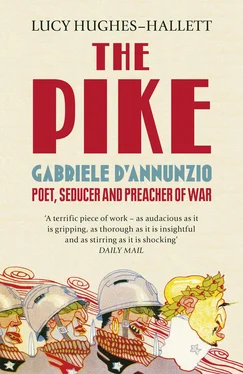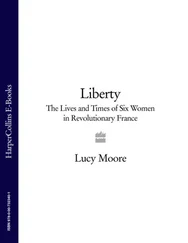I have tried to avoid the falsification inevitable when a life – made up, as most lives are, of contiguous but unconnected strands – is blended to fit into a homogeneous narrative. In Venice in 1908 for the premiere of The Ship, d’Annunzio attended banquets and civic ceremonies in his honour, delivering convoluted speeches full of noble sentiments and incitements to war. He records, though, that ‘between one acclamation and another’ he spent a great deal of time hunting for the perfect present for his mistress. An antique emerald ring – which he could certainly not afford (he was at this period unable to go home for fear of his creditors) – satisfied him, but there was still the question of a box to put it in. He visited half a dozen places before finding the very thing – a pretty little casket in green leather (to match her eyes) in the shape of a miniature doge’s hat. I aim to do justice both to the man pontificating at the banquet, and the man fossicking through curio shops.
Two images help to describe my method. The first dates from 1896, when d’Annunzio was thirty-three, and staying in Venice to be near Eleonora Duse. There he came to know Giorgio Franchetti, who had recently bought the Ca’ d’Oro, the most fantastical and ornate of all the palaces along the Grand Canal, and was restoring it to its fifteenth-century Venetian-Moorish splendour. Franchetti was working himself on the installation of a mosaic pavement, crawling, covered with sweat and stone dust, over the varicoloured expanse of rare stones with slippers strapped to his knees. There d’Annunzio would join him, laying tiny squares of porphyry and serpentine in the fresh cement. Placing comments and anecdotes alongside each other like the tesserae in a pavement, my aim has been to create an account which acknowledges the disjunctions and complexities of my subject, while gradually revealing its grand design.
Another image comes from Tom Antongini, who knew and served d’Annunzio well for thirty years as his secretary, agent, personal shopper, and, in the sexual sphere, Leporello to his Don Giovanni. Antongini described the hectic months d’Annunzio spent in Paris in 1910 as ‘kaleidoscopic’. In an old-fashioned kaleidoscope, fragments of jewel-bright glass are rearranged as the cardboard tube is twirled – the same parts, a changing pattern. Images and ideas recur in d’Annunzio’s life and thought, moving from reality to fiction and back again: martyrdom and human sacrifice, amputated hands, the scent of lilac, Icarus and aeroplanes, the sweet vulnerability of babies, the superman who is half-beast, half-god. I have laid out the pieces: I have shown how they shift.
D’Annunzio has been much disliked. His contemporary, the philosopher and historian Benedetto Croce, said he was ‘steeped in sensuality and sadism and cold-blooded dilettantism’. Tom Antongini, who was fond of him, wrote that he ‘has been accused of polygamy, adultery, theft, incest, secret vices, simony, murder, and cannibalism … in short, Heliogabalus is his master in no particular’. When, on his death in 1938, there was discussion in the British Foreign Office as to whether it would be in order to offer official condolences, the proposal was vehemently opposed by Lord Vansittart, who called him ‘a first-class cad’. This hostility persists. Mark Thompson, the outstanding historian of Italy’s part in the Great War, writes with judicious moderation about General Cadorna, the Italian commander-in-chief who sent hundreds of thousands of soldiers to a certain death. Thompson’s tone, in describing Mussolini and the beginnings of fascism, is temperate. But these are the words he uses of d’Annunzio: ‘odious’, ‘vicious’, ‘psychotic’.
I have been sparing of such language. I am a woman writing about a self-styled ‘poet of virility’ and a pacifist writing about a warmonger, but disapproval is not an interesting response. D’Annunzio cannot be dismissed as being singularly hateful or crazy. He helped to talk his country into an unnecessary war, and the views he expressed, then and throughout his life, are frequently abhorrent. But to suggest that his thinking was aberrant is to deny the magnitude of the problem he presents. Over and over again throughout the Great War, d’Annunzio called upon teenage conscripts, very few of whom had any idea what Italy’s war aims were, to die because the blood of those who had already died called out to them from the earth to emulate their ‘sacrifice’. At the time of writing a very similar thought – less floridly expressed – is regularly advanced to justify the continuation of the war in Afghanistan. Many have died. To admit that the fighting is futile, and put a stop to it, would be to betray them. So more must die. This reasoning may be odious (I consider it so). But if to be ‘psychotic’ is to think in a way few healthy people think, then it is not psychotic. It is all too normal.
In 1928, Margherita Sarfatti published a biography of her lover, Mussolini. In it she praised d’Annunzio for having ‘prophesied, preached and fought the war’ (preaching war being, in fascist opinion, a laudable practice) and hailed the poet as having given expression to ‘an arrogant, knightly, derisive, fascinating and cruel spirit that belongs to the immortal youth of fascism’. Later Sarfatti, who was Jewish, would have to leave Italy hastily in order to escape that ‘fascinating and cruel spirit’, but for the time being she adored it, and admired d’Annunzio, whose work seemed to her to be as full of ‘daring, hope, greatness and limitless faith’ as the sound of the blackshirts belting out popular songs as they converged on Rome in October 1922.
In the first winter of the Great War, d’Annunzio was living in France, and made several trips to the front as a privileged observer. There he saw – or pretended to have seen – dead soldiers bound upright, to stakes, in groups of ten. At the time, Mussolini had only recently left the Italian Socialist Party and had yet to find a new following. But already d’Annunzio had found an image all too hideously symbolic of the militarism which he himself so enthusiastically approved, and of the political creed which would shortly grow out of it. Those bloody clumps of upstanding corpses reminded him of an emblem frequently shown on Roman coins, one which would soon, once again, be omnipresent in Italy, that of a bundle (a fascio) of rods tied around an axe. The axe signified the law’s power over life and death. The bundled rods represented the gathering of powerless individuals into a single powerful entity, a ‘fascist’ state.
SIGHTINGS
ROME, 1881. Here is Gabriele d’Annunzio, seventeen years old, just out of school, the precocious author of two highly praised volumes of verse. Observing him is Edoardo Scarfoglio, himself only twenty-one, another ambitious young man making his way in the ancient capital of the eleven-year-old Italian nation. Scarfoglio is in the office of the weekly paper of which he is editor. The room is full of chattering people. Scarfoglio is lounging on a bench, yawning, when in comes the juvenile poet. ‘At the first glimpse of this little fellow with his curly head and sweetly feminine eyes … I started and sprang up, extraordinarily struck … Gabriele was the object of a craze, of an incredible cult, for all of us. He was so friendly and modest, and he carried the weight of his newborn glory with such grace that everyone ran to him, spontaneously drawn by feelings of friendship and affection.’
The curls will soon be gone (by the age of thirty d’Annunzio will be almost completely bald) and the modesty may never have existed outside of Scarfoglio’s imagination. Already the young poet is an adroit self-publicist. A few months before his arrival in Rome, he anonymously informed newspaper editors of his own untimely death in a fall from his horse. The pathetic story of the brilliantly gifted youth, cut off at the outset of what would surely have been a dazzling career, was widely reported and lamented over. The second volume of poems by the tragic boy, published later that month, sold well. By the time the ‘mistake’ was discovered, d’Annunzio was considerably more famous than mere merit, however substantial, could have made him.
Читать дальше












